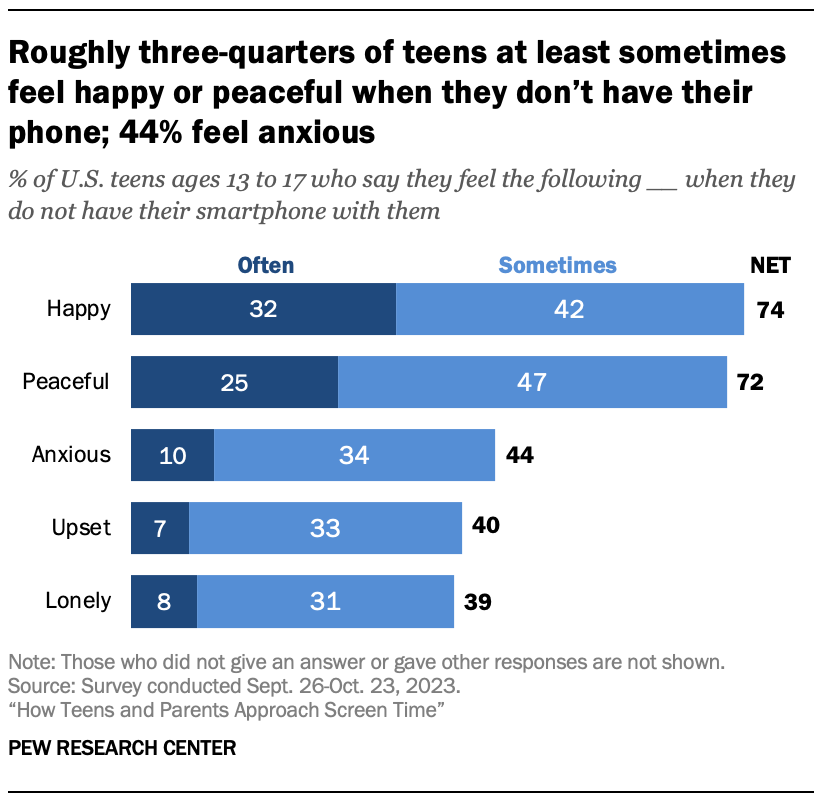They Praised AI at SXSW—and the Audience Started Booing
My survey confirms that consumers are getting angry about new tech (and not just AI)
Tech leaders gathered in Austin for the South-by-Southwest conference a few days ago. There they showed a video boasting about the wonders of new AI technology.
And the audience started booing.
The Honest Broker is a reader-supported guide to music, books, media & culture. Both free and paid subscriptions are available. If you want to support my work, the best way is by taking out a paid subscription.
At first, just a few people booed. But then more and more—and louder and louder. The more the experts on screen praised the benefits of artificial intelligence, the more hostile the crowd got.
The booing started in response to the comment that “AI is a culture.” And the audience booed louder when the word disrupted was used as a term of praise (as is often the case in the tech world nowadays).
Ah, but the audience booed the loudest at this statement:
“I actually think that AI fundamentally makes us more human.”
The event was a debacle—the exact opposite of what the promoters anticipated.
And it should be a reality check for the technocracy.
If they were paying attention, they might already have a hunch how much people hate this stuff—not just farmers in Kansas or your granny in Altoona, but hip, progressive attendees at SXSW.
These people literally come to the event to learn about new things, and even they are gagging on this stuff.
It’s more than just fears about runaway AI. Prevailing attitudes about digital tech and innovation are changing rapidly in real time—and not for the better. The users feel used.
“We have arrived at the scary moment when our prevailing attitude to innovation has shifted from love to fear.”
Meanwhile the tech leaders caught in some time warp. They think they are like Steve Jobs launching a new Apple product in front of an adoring crowd.
Those days are gone.
Not even Apple is like Apple anymore. A similar backlash happened a few weeks ago, when Apple launched its super-high-tech virtual reality headset. The early response on social media was mockery and ridicule—something Steve Jobs never experienced.
This is the new normal. Not long ago we looked to Silicon Valley as the place where dreams came from, but now it feels more like ground zero for the next dystopian nightmare.
I lived through the excitement of the early Internet—and even ran two web startups, including a San Francisco web development company with sixty software developers on the payroll. I was filled to the brim with enthusiasm about the web, but everybody was back then.
That was then, this is now. Everybody I talk to now is wary and worried about the dominant digital platforms. They don’t love them, they don’t trust them, and increasingly they don’t even want them.
This is not a passing fad. We have arrived at the scary moment when our prevailing attitude to innovation has shifted from love to fear.
When did I start to lose confidence in new tech?
There were warning signs all along the way. But my personal tipping point happened in the last 18 months—when every technology I touched seemed be getting worse, not better.
Was it just my imagination? Could all the tech titans really be deteriorating at the same time?
I once loved Apple, but their products started to underperform in shocking ways.
I once trusted Google results, but they now seem cumbersome and intentionally deceptive.
I was an early adopter of Facebook, but I increasingly feel brutally manipulated each time I visit the platform.
I once surfed Twitter like a pro, but now I have to battle the algorithm every time I tweet.
I wanted to know if others felt the same. So I conducted four Twitter polls.
The first poll asked a simple question about AI: Will it make your life better or worse?
As you can see, naysayers outnumbered AI enthusiasts by more than a 2-to-1 margin.
But the verdict on search engines and other web platforms was even harsher. Respondents believe these are actually getting worse over time—and by a staggering 7-to-1 margin!
I was even more shocked by the response to my question about social media. I conducted this poll on Twitter—so I anticipated a bias in favor of social media. Yet almost 80% of respondents believe that society would benefit if social media crashed, and nobody could use it for a week.
These people aren’t just unhappy about specific apps. They have lost confidence in the entire leadership of the tech community.
What a change from the days when Steve Jobs got heralded as a global role model, and Bill Gates was more admired than the Pope or Dalai Lama.
You will ask—quite reasonably—if my survey respondents are just old curmudgeons (like me). Maybe. So let’s look at what teens think about digital tech.
A new survey conducted by Pew Research reveals that teenagers have negative feelings about the smartphones they use constantly

Even more revealing: Teens see the same screen dependence in their parents.

I could provide more market research, but do you really need to see it? Almost every one of you feels this in your gut: You can’t trust the tech. Not anymore.
Let me make my own allegiances clear. I love technology, and still believe it can solve many of our most pressing problems. But we need and deserve healthy innovation that contributes to human flourishing.
That’s not happening now. And hostility will continue to build until our tech leaders decide (or are forced) to change their ways.
They’re doing so many things wrong, I can’t even begin to scratch the surface here. But I’ll list a few warning signs.
You must be suspicious of tech leaders when…
Their products and services keep getting worse over time.
Their obvious goal is to manipulate and monetize the users of their tech, instead of serving and empowering them.
The heaviest users of their tech suffer from depression, anxiety, suicidal impulses, and other negative effects as a result.
They stop talking about quality, and instead boast incessantly about scalability, disruption, and destruction.
They hide what their technology really does—resisting all requests for transparency and disclosure.
They lock you into platforms, forcing you to use new ‘features’ and related apps if you want to access the old ones.
They force upgrades you don’t like, and downloads you don’t want.
Their terms of use are filled with outrageous demands and sweeping disclaimers.
They destroy entire industries not because they offer superior products, but only because as web gatekeepers they have a chokehold on information and customer flow—which they use ruthlessly to kill businesses and siphon off revenues.
Every one of those things is happening right here, right now.
We’re doing the technocracy a favor by calling it to their attention. If they get the message, they can avoid the coming train wreck. They can return to real innovation, with a focus on helping the users they now so ruthlessly exploit.
Why can’t they see this?
Maybe it’s because they live in an echo chamber where tech is beautiful, and they are admired as Promethean delivers to a suffering world.
Maybe that’s how it feels in Palo Alto or Cupertino. But everywhere else, the vibe is less groovy. The public no longer admires their tech titans, but fears them. Users no longer welcome their innovations, but mock them. This antipathy will quickly escalate into hostility, maybe even rage.
If the current tech leaders can’t figure this out, they will be wiped away by history—that’s happened before, and will happen again. And then the obvious thing will occur. They will get replaced by wiser decision-makers who understand that tech serves human beings, not the other way around.
Further Reading:
The above article on progress is part of an ongoing series. In the articles below, I probe the growing dysfunction of the dominant tech platforms and initatives and explore more human-centered alternatives.
I am able to write articles like this because I operate independently, without advertising or corporate affiliation. If you want to support my work by taking out a paid subscription, click here.









We need more booing.
People of influence and authority could not care less whether AI or any other tech is liked or popular. They care about whether the tech will bring them power and money.
That's it. Power and money. Sycophants can always be bought.